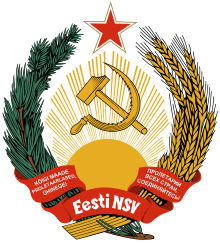Anthem of the Estonian Soviet Socialist Republic
| English: State Anthem of the Estonian SSR | |
|---|---|
 |
|
|
State anthem of |
|
| Lyrics | Johannes Semper |
| Music | Gustav Ernesaks |
| Adopted | 20 July 1945 21 July 1956 (modified version) |
| Relinquished | 8 May 1990 |
| Music sample | |
|
|
|
The State Anthem of the Estonian SSR (Estonian: Eesti Nõukogude Sotsialistliku Vabariigi hümn, Cyrillic: Ээсти Нъукогуде Социалистлику Вабарийги хӱмн; Russian: Гимн Эстонской Советской Социалистической Республики, Gimn Estonskoy Sovetskoy Sotsialisticheskoy Respubliki) was the anthem of the Estonian Soviet Socialist Republic under the Soviet Union from 1945 to 1990.
During the decades of the Soviet occupation of Estonia, the official Estonian anthem was strictly forbidden. Throughout the years of prohibition, Lydia Koidula's poem, Mu isamaa on minu arm, with a melody by Gustav Ernesaks served as means of expressing national feelings, and was regarded as an unofficial anthem of Estonia. With the restoration of Estonian independence in 1991 however, the official national anthem from 1920 by Fredrik Pacius with lyrics by Johann Voldemar Jannsen has been restored.[3]
The music of the Estonian Soviet Socialist Republic's anthem was composed by Gustav Ernesaks, and the lyrics were written by Johannes Semper. It, Karelo-Finnish SSR and Georgian SSR anthem were the only ones not to mention the Russian people. On 21 July 1956, the third stanza of the lyrics was changed to remove mentions of Joseph Stalin. This is the version presented here.
...
Wikipedia
